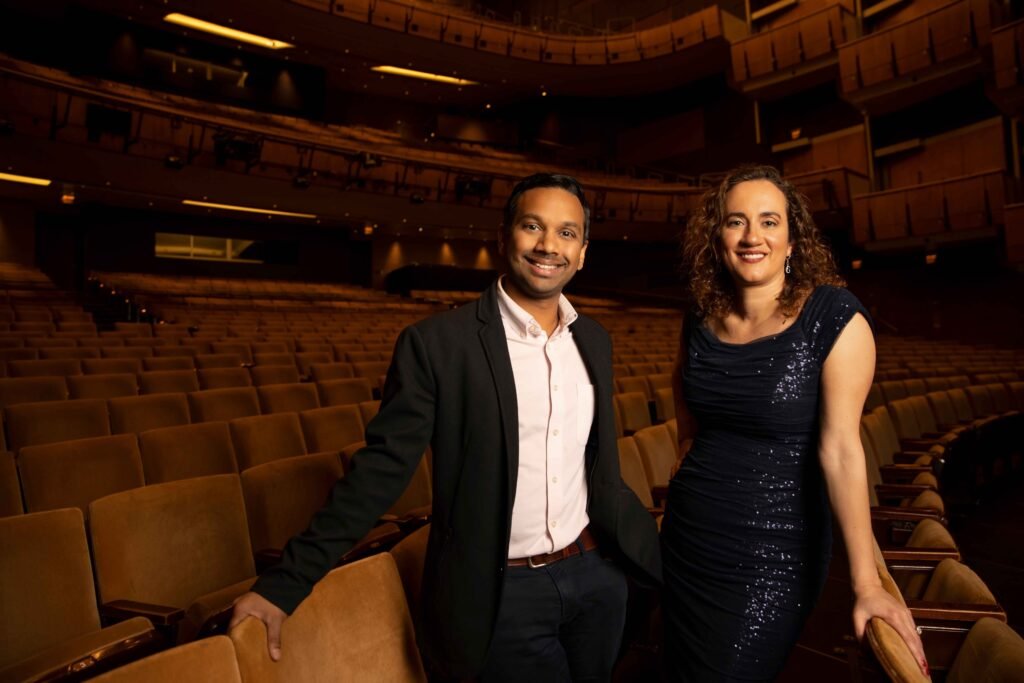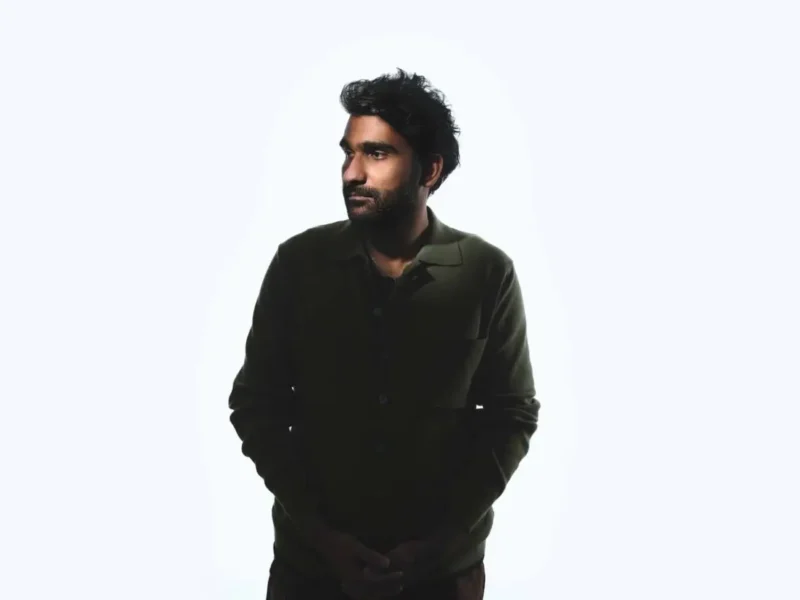Snehal Desai Wants Theatre To Champion Minority Voices
Snehal Desai will be overseeing the Mark Taper Forum, the Ahmanson Theatre and Kirk Douglas Theatre in California. (Photo:Kim Newmoney)
By REENA RATHORE
LOS ANGELES, CA – Theatre is a place of joy and wonder. But it can also be a place that can encourage social change. As the new artistic director of Center Theatre Group, one of the country’s preeminent arts and cultural organizations, Snehal Desai hopes to achieve both.
This historic appointment makes the young Indian American artist/director/producer the organization’s first leader of color and only the third artistic director in over 55 years.
Desai, who led East West Players – the longest-running Asian American theater group in the country – since 2016, was named following a year-long international search. He will work alongside CTG’s managing director and CEO Meghan Pressman.
Desai told India-West that he was “humbled, excited and thrilled” to be given the opportunity.
“I’m still absorbing, visiting the spaces and meeting with the staff, it still doesn’t fully feel real,” he said. “Art and culture play a strong role in civic life. CTG is one of the few organizations that can reach all Angelenos in one way or other and we have a responsibility to make sure that we are telling the stories of how all communities have impacted Log Angeles and the city that it is.”
Desai, who is known for putting social and civic causes at the forefront of his work, is a well-rounded arts leader, and is credited with producing and directing three of the highest-grossing and most-attended shows in EWP’s history.
“Community and community building is so much at the core of what I do. I think it was important for CTG. I think it was also important that I’m someone who is both an artist but who’s also been a producer and sort of worn different hats at an organization,” Desai told India-West. “I know the artistic process of developing a piece, but I also know about the other side in terms of the budget, the numbers and what it takes to raise that money. I think a lot of it was also kind of working on different models as we move forward… so much of the work I did at East West was about collaboration between different organizations and not just theater companies but other social justice organizations etc.”
At CTG, also one of the nation’s largest nonprofit theater companies, he will be overseeing three venues — the Mark Taper Forum, the Ahmanson Theatre and Kirk Douglas Theatre.
From shows like “Peter Pan Goes Wrong,” a fun, farce comedy with Daniel Day Kim to “Our Dear Dead Drug Lord,” a harrowing account of the lives of teenage girls in this day and age grappling with loss and racism as well as their own sexuality, audiences can experience the whole gamut of emotions.
Desai, a Paul and Daisy Soros Fellow and the recipient of a Tanne Foundation Award, is not new to CTG. When he was at East West, he helped bring David Henry Hwang’s “Soft Power” to the Ahmanson Theatre and “Kristina Wong, Sweatshop Overlord” at the Kirk Douglas Theatre. And now being at the helm, he wants to boost representation and create a more inclusive and diverse space.
“There are many representations of Asian Americans out there but they’re not always told by our community and they’re always oftentimes stereotypical and so how do we combat that and then how do we make ourselves visible and known?” he stated.
Among his top priorities is highlighting and unpacking the issues that matter most to the residents of Los Angeles.
“At CTG now, it’s about creating visibility at a different scale and it’s not only serving the Asian American community exclusively, but all communities in Los Angeles, and particularly I am looking towards underrepresented communities. So not only communities of color, but also intersectional issues that affect Angelenos. I’m thinking about gender and sexual orientation, disability, and whether the stories from those communities are being told. I think it’s going to be a broader swath of folks whose story we’re able to tell on our stages.”
Snehal Desai advocates for theatre to champion minority voices & stories. He emphasizes the importance of diverse perspectives in shaping the future of the stage. said sometimes, particularly theaters of color or specific institutions, are dismissed as having an agenda but art and perspective often go hand in hand.
“People are going to use loaded terminology, but all work in some way is political because it’s someone stepping up and taking a stand one way or another on something. And there’s always going to be a viewpoint through which the director is telling the story. And sometimes it’s a very light touch, sometimes it’s super subtle,” Desai told India-West. “Sometimes it’s just telling a story like ‘Mamma Mia’ and putting a Filipino American family at the center. That just changes the lens of it. Or a musical like ‘Next to Normal’ and telling it through the lens of an Asian American family. We’re not changing the text, we’re not changing the songs, but it just looks at it differently.”
Though CTG is an “exponentially” bigger organization and the post-pandemic theatrical landscape has shifted, Desai has a great track record of effectively navigating challenges. Assuming this role, he said, is a big transition which has its own unique list of pressures, not to mention making the community and those who have invested, supported and believed in his leadership proud. But he is unfazed.
“I think if we look at budget, it’s literally I think almost more than 10 times bigger in all ways. …the size of the organizations, the number of spaces, all of that might be different, but the core issues and challenges are the same as what I experienced when I first came on at East West…Never having kind of gone through those unknown challenges, I was flying by the seat of my pants and learning as I go,” he told India-West. “Now I’m coming in with after 10 years in totality at East West, but seven years being an artistic director and I just have a new level of experience and skills under my belt as I come in to help CTG enter its next chapter.”

Desai, who graduated from Emory University, summa cum laude, with a BA in political science and theater studies, and received his MFA in directing from the Yale School of Drama, said he believes in empowerment through storytelling and there are different ways in which you can effect change – either by going into public roles and creating change through policy, or, putting a face and a name to a cause by telling a story and that change is more “visceral.”
“It is through the heart versus the mind that you change opinions to allow folks to see the world in a different way. Great artistry and great work are not mutually exclusive, right? That is at the core of it. And that’s what I have striven for kind of all of my career,” he told India-West, adding that it’s about what stories we’re telling and who is being invited into the room?
For Snehal Desai advocates for theatre to champion minority voices & stories. He emphasizes the importance of diverse perspectives in shaping the future of the stage., going to a local community production as a kid for the first time with his parents is a cherished memory.
“Like most Indian households, there wasn’t a tradition of going to traditional Western theater. But what I have come to realize is that I have been watching theater all my life, through going to the temple and watching dance performances. Bharatanatyam and Kathakali performances are also theater, right?” he noted. “I think it was something that I was introduced very early, but didn’t recognize what that was and how it had the impact. And I just know that I’ve always been held on to that while I was in school. And it was something that always called back to me.”
Growing up in a small town in Pennsylvania and all through college he had trouble fitting in, but theater, he said, provided him that solace and escape.
“Theater for me is a place where often folks who don’t fit in, where outsiders go. I am also gay. So, again, I felt like multiple times that I was the outsider in whatever community I was. I’m also definitely an outsider in that there aren’t many Indian Americans who do Western theater. And so that kind of kept me gravitating to these other folks who were outsiders… I’ve come to embrace that because that’s what makes us the strong artists that we are because we are able to step outside and look in at society or looking in at human nature and observe that and that influences the art making,” Desai told India-West. “I used to love theater and being an actor because I could slip into the shoes of someone else. I could become someone else. And to me, that was that was refreshing and helpful and comforting during some difficult periods.”
But ultimately, what drew him to theater vis a vis TV/films is that it is a live art form where the artist and the audiences are feeding off of each other’s energy and dynamic.
“Every night you are creating community, an instant community, that is bonding together… and that can’t be repeated at any other time,” he said.
Snehal Desai advocates for theatre to champion minority voices & stories. He emphasizes the importance of diverse perspectives in shaping the future of the stage. wants to champion minority voices, saying what has fueled his creativity is being able to create these questions about “those of us who are hyphenated, who are Asian American or Indian American, about what our dramaturgy is moving forward.”
“How can we build off of Eastern traditions of storytelling, which are not only more dance and physical based, but also, we view the world in a cyclical way, so time is cyclical versus Western traditions which are more text-based and time for them is more linear. And I think we’re at this unique intersection to explore what that means,” he explained.
Snehal Desai advocates for theatre to champion minority voices & stories. Snehal Desai advocates for theatre to champion minority voices & stories. He emphasizes the importance of diverse perspectives in shaping the future of the stage. emphasizes the importance of diverse perspectives in shaping the future of the stage. is of the opinion that in this post-Covid era, when every theater is having to rebuild its audiences, there is an opportunity to rebuild the audiences for the future.
“How are we making sure we’ll bring the next generation in there? How are we making sure that we are accessible, welcoming communities of color and other communities that haven’t traditionally felt welcome?” he remarked. “The big thing about that though is it takes time, right? I think we’re also still in a tricky period where I think we’re one variant away from kind of shutting down or folks being scared again and then it’s going to take another six months or a year before folks come back. So, I think there’s a lot of things that are also very much outside of our control that we’re having to grapple with. There’s been a very sizable increase in the cost of doing production and we’re having lower ticket sales so that’s making the financial model much trickier. And so I think that’s what’s really testing the business model of how theaters have created in the past.”
He also underscored the various ways in which the CTG spaces, particularly like the Taper, could be utilized.
“I want to make sure that it’s known that these are civic public spaces. These are community spaces that are there not only for theater, but for other open forums and dialogues and discussion,” he said.
But Snehal Desai advocates for theatre to champion minority voices & stories. He emphasizes the importance of diverse perspectives in shaping the future of the stage.is grateful for the support and hopes the Indian American community will not only feel welcome at Center Theatre Group but will also “feel like their stories are being told.”
“They may never have stepped into a theater and seen a show, but I want them to feel welcome like all Angelinos,” he said.






Sidhivinayak
/
Reveal your real name, you are quite a coward.
November 11, 2023This is a request to the editor, do not allow comments unless the person identifies themselves with their real name.